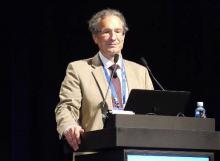Empagliflozin: EASE-1 study findings
Dr. Thomas Pieber of the Medical University of Graz in Austria presented the results of the 4-week phase II EASE-1 study, which included 75 patients with type 1 diabetes who were randomized to received empagliflozin once-daily at doses of 2.5 mg (n = 19), 10 mg (n = 19), or 25 mg (n = 18), or placebo (n = 19) for 28 days as adjunctive treatment to insulin.
The study findings (Diabetes Obes Metab. 2015 Jun 17. doi: 10.1111/dom.12494.) showed that empagliflozin used as an adjunct to insulin significantly increased urinary glucose excretion after 1, 7, and 29 days. Significant improvements in HbA1c were achieved with lower (12%-14% vs. baseline) total daily doses of insulin being used. Empagliflozin was also associated with weight reduction (–1.4 to –1.7 kg) and generally lower rates of moderate hypoglycemia and no episodes needed assistance, compared with placebo. There were no cases of DKA reported, but fasting beta-hydroxybutyrate was slightly raised at week 4 with all doses of empagliflozin.
One delegate commented after Dr. Pieber’s presentation that, although it was a well-conducted study and provided some evidence of an effect of SGLG2 inhibitors in patients with type 1 diabetes, he had “great reservation” about using this class of antidiabetic drug in this clinical situation. The delegate’s concern was around expanding the use of the drug to all patients, some of whom may not have regular eating patterns or may have abnormal eating behaviors who might be at higher risk for DKA. “Of course, in a controlled study, it is not seen, but you see already some small signal of increase of ketone bodies, so I would say it should be used with great reservation in all patients and can only be used in well-educated, well-monitored patients.”
Dr. Pieber responded: “I think we have to do clinical trials to see if there is a benefit or not for our patients. So this was a study performed as a dose-finding study that led to a phase II program and hopefully will lead to a phase III program.” He added that, bearing in mind the positive findings of the EMPA-REG OUTCOME study showing that empagliflozin reduced major cardiovascular outcomes in patients with type 2 diabetes to be presented later at the meeting, “If something works in type 2 we definitely should test it in type 1 diabetes.”


